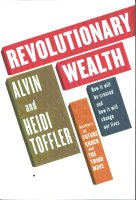
It is with their discussion of the knowledge economy that some unusual insights emerge. They coined the terms “prosumerism” and “prosumers” in 1980 and continue to use the term in the book:
…we therefore invented the word
prosumer for those of us who create goods, services or experiences for our own
use or satisfaction, rather than for sale or exchanges. When, as individuals or
groups, we both produce and consume our own output, we are “prosuming…”
Today, given the shrinkage of the world because of advances in transportation,
communications and
Examples of this prosumerism abound on the Internet: the Trinity Blog, Wikipedia (a free on-line encyclopedia), and open source software. This concept is well developed in the book and it explains many trends in our society. It is well worth reading this portion of the book for the insights they develop.
In essence (and this is the point the Tofflers miss) prosumerism finds its greatest expression in Christian charity. The Tofflers recognize prosumerism has existed for centuries, but they don’t acknowledge the Christian legacy that gives rise to the term. The founding of 95% of the world’s hospitals, the establishment of numerous universities and charities, even the recent aid for Katrina victims all form part of the Christian legacy that is unrecognized in the book. Most unfortunate, therefore, is that the book contains several attacks upon Christianity.
…those who insist that, even after two thousand years of problematic interpretations and mistranslations, the Bible is error-free, and that, moreover, its every word must be understood in its most literal sense. (p. 25)
“Since God has nowhere promised an inerrant transmission of Scripture, it is necessary to affirm that only the autographic text of the original documents was inspired and to maintain the need of textual criticism as a means of detecting any slips that may have crept into the text in the course of its transmission. The verdict of this science, however, is that the Hebrew and Greek text appear to be amazingly well preserved, so that we are amply justified in affirming, with the Westminster Confession, a singular providence of God in this matter and in declaring that the authority of Scripture is in now way jeopardized by the fact that the copies we possess are not entirely error-free.” The Chicago Statement on Biblical Inerrancy as quoted in James Montgomery Boice, Standing on the Rock (Wheaton: Living Students, TyndaleHouse Publishers, Inc., 1984), 137.
Notice that neither statement insists on error free transmission but the statements do agree on error free inspiration and autographs.
Part 5 of the book also does not portray Christianity in a good light. This section of the book digresses to a discussion of knowledge and truth. Since the Tofflers define knowledge as a form of wealth it follows that they must then define good and effective knowledge vs. harmful knowledge. The section advocates science as the only truth-test criteria that “depends on rigorous testing.”